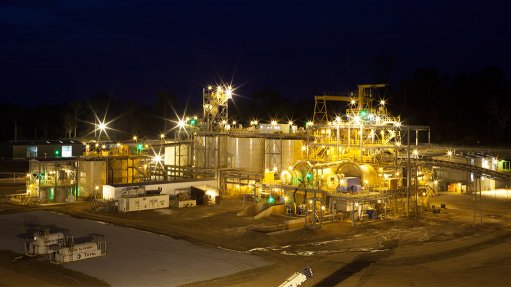
AGBAOU MINE To date, Agbaou has paid $14-million in royalties to the Côte d’Ivoire government
TSX-listed gold miner Endeavour Mining’s Agbaou gold mine, in Cote d'Ivoire, has fully repaid its shareholder loans of $181-million, with the final loan payment done on November 27, 2015.
The mine, which is 200 km north of Abidjan, is 85%-owned by Endeavour’s Ivorian subsidiary, Agbaou Gold Operations, while the State of Côte d'Ivoire and State-owned mining company Sodemi hold a 10% and a 5% free carried interest respectively.
The shareholder loans funded the $145-million mine construction cost and other development costs, including feasibility studies and exploration programmes. Agbaou has also progressed into a dividend-paying position for the distribution of its free cash flow.
“By all measures, the Agbaou mine has had an exceptional initial two years of operation. Even with the low gold-price environment, it has fully repaid its construction capital and all its historic costs related to exploration and studies in only 22 months, thereby demonstrating a very strong return on investment,” states Endeavour CEO Neil Woodyer.
He adds that, to date, Agbaou has paid $14-million in royalties to the Côte d’Ivoire government; the country will also benefit from dividends through its 15% carried interest in the mine.
“Agbaou is an example of the success of our approach of recruiting and training Ivorian nationals, who now represent 92% of the mine’s workforce,” Woodyer enthuses.
Endeavour strategy and business development executive VP Vincent Benoit tells Mining Weekly that Agbaou was delivered ahead of time and below its $160-million budget, currently producing above guidance at a low all-in sustaining cost.
He says that, since commercial production started in January 2014, the mine has been able to increase throughput by 30% above the initial design capacity.
Benoit highlights that, over this period, exploration success around the mine has also enabled the company to successfully delineate further high-grade zones, which has led to an increase in reserves and an extension of the expected mine life.
“These are all factors that have led us to build a successful mine, even in the current circumstances,” he contends.
Further, Benoit says Endeavour’s aim is to extend Agbaou’s mine life and replace reserves throughout 2016, with further extension of oxide mineralisation through the continuation of drilling programmes.
“We are outlining a larger, continuous West pit and are reducing the overall strip ratio. On an operational basis, we are looking to install a secondary crusher to maintain throughput at the mill, despite a changing ore mix. We firmly believe in the exceptional potential of Agbaou,” he states.
Mining in Côte d'Ivoire
Benoit comments that the company’s expertise and continuing support of the Ivorian government have been essential in Endeavour’s progressing from a feasibility study to a fully completed mine in only 16 months.
“Having carefully considered the engineering design during the feasibility stage has enabled to us foresee possible challenges ahead of time and meet our construction budget and deadlines.”
Further, the largest part of the resource-rich Birimian greenstone belt, for which West Africa is known, extends into Côte d’Ivoire. This part is also the least explored of the belt, Benoit notes.
“The number of mining companies conducting exploration in the country has significantly increased over recent years, as the country has emerged as a good mining jurisdiction. Endeavour is strategically positioned, with one of the largest exploration packages in the country.”
Besides Agbaou, the company also owns the Ity mine, which is 480 km north-west of Abidjan. The mine’s gold production of about 250 000 oz/y accounts for 40% of total group production, he highlights.
“We are confident in this country’s potential and in the synergies, such as the centralised source of production which it provides for us,” Benoit asserts.